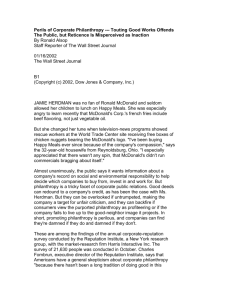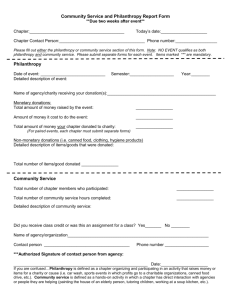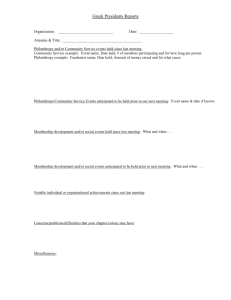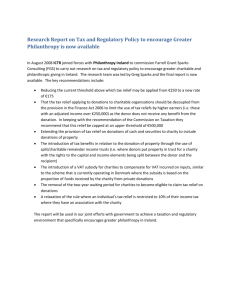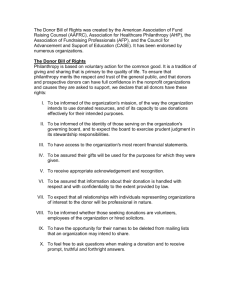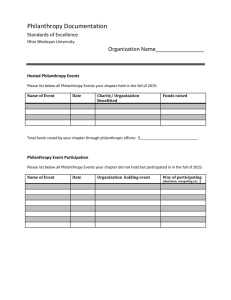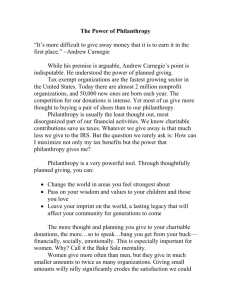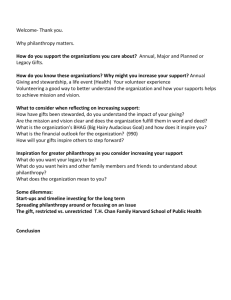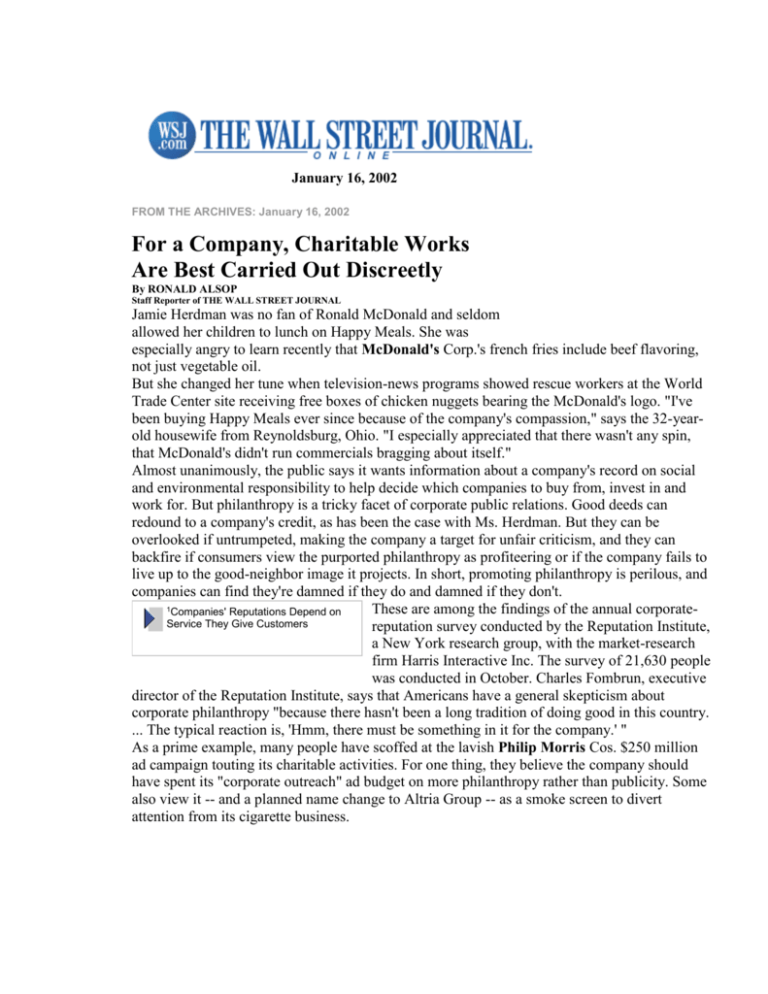
January 16, 2002
FROM THE ARCHIVES: January 16, 2002
For a Company, Charitable Works
Are Best Carried Out Discreetly
By RONALD ALSOP
Staff Reporter of THE WALL STREET JOURNAL
Jamie Herdman was no fan of Ronald McDonald and seldom
allowed her children to lunch on Happy Meals. She was
especially angry to learn recently that McDonald's Corp.'s french fries include beef flavoring,
not just vegetable oil.
But she changed her tune when television-news programs showed rescue workers at the World
Trade Center site receiving free boxes of chicken nuggets bearing the McDonald's logo. "I've
been buying Happy Meals ever since because of the company's compassion," says the 32-yearold housewife from Reynoldsburg, Ohio. "I especially appreciated that there wasn't any spin,
that McDonald's didn't run commercials bragging about itself."
Almost unanimously, the public says it wants information about a company's record on social
and environmental responsibility to help decide which companies to buy from, invest in and
work for. But philanthropy is a tricky facet of corporate public relations. Good deeds can
redound to a company's credit, as has been the case with Ms. Herdman. But they can be
overlooked if untrumpeted, making the company a target for unfair criticism, and they can
backfire if consumers view the purported philanthropy as profiteering or if the company fails to
live up to the good-neighbor image it projects. In short, promoting philanthropy is perilous, and
companies can find they're damned if they do and damned if they don't.
1
These are among the findings of the annual corporateCompanies' Reputations Depend on
Service They Give Customers
reputation survey conducted by the Reputation Institute,
a New York research group, with the market-research
firm Harris Interactive Inc. The survey of 21,630 people
was conducted in October. Charles Fombrun, executive
director of the Reputation Institute, says that Americans have a general skepticism about
corporate philanthropy "because there hasn't been a long tradition of doing good in this country.
... The typical reaction is, 'Hmm, there must be something in it for the company.' "
As a prime example, many people have scoffed at the lavish Philip Morris Cos. $250 million
ad campaign touting its charitable activities. For one thing, they believe the company should
have spent its "corporate outreach" ad budget on more philanthropy rather than publicity. Some
also view it -- and a planned name change to Altria Group -- as a smoke screen to divert
attention from its cigarette business.
John Hyde, a retiree in Placerville, Calif., says it's hard to believe
Philip Morris is "a good guy just because it donates water to flood
victims or helps the hungry." (Philip Morris, which ranked overall
59th out of the 60 companies in the survey, believes it is "viewed
as changing for the better and being more socially responsible"
because of the campaign, says a spokeswoman.)
The aftermath of Sept. 11 illustrates some of philanthropy's
pitfalls. Verizon Communications informed its customers of its
charitable donations and its efforts to provide telecommunications
services in downtown Manhattan through a letter rather than
advertising. But even that approach offended a few people who felt
the company was taking advantage of the tragedy to promote itself.
Still, "we're glad we did the letter," says Mary Beth Bardin, head
of communications. "The vast majority of our customers
appreciated it."
Avon Products Inc. tried not to seem mercenary in full-page newspaper ads that thanked its
sales representatives for raising more than $7 million in charitable contributions through the
sale of a heart-shaped American flag pin. "We were very careful not to have a phone number or
our Web site address in the ad so it didn't look like we were trying to sell something," says
Susan Heaney, an Avon spokeswoman.
But reticence had its drawbacks for Procter & Gamble
HIGH MARKS
Co. and Honda Motor Co., both of which performed
Top-rated companies for social
good works after the attacks but didn't promote them.
responsibility
Each was harshly criticized by respondents to the
1. Johnson & Johnson
Harris/Reputation Institute survey for inaction. One
2. Coca-Cola
respondent accused P&G, which provided more than
3. Wal-Mart
$2.5 million in cash and products, of doing "absolutely
4. Anheuser-Busch
5. Hewlett-Packard
nothing to help!" Honda, which donated cash, all-terrain
6. Walt Disney
vehicles and generators for use at Ground Zero, was
7. Microsoft
8. IBM
blasted for lacking compassion and not supporting
9. McDonald's
America.
10. 3M
P&G is philosophical. The company likes to get credit
11. UPS
12. FedEx
with the public, says Carol Talbot, vice president and
13. Target
trustee of the Procter & Gamble Fund. "But you
14. Home Depot
15. General Electric
certainly don't want to capitalize on a disaster," she
says. "We did internal communications and a news
Source: 2001 Harris Interactive/ Reputation
advisory in Cincinnati and other places where we have
Institute survey
major operations, but we would never have advertised
what we did."
After Sept. 11, Johnson & Johnson sponsored a special
issue of Newsweek magazine about the spirit of America, and donated the advertising space to
various nonprofit organizations. "We don't take much to touting what we feel is a special
obligation to the community since we're in the business of health care," says Willard Nielsen,
corporate vice president of public affairs. But Mr. Nielsen says J&J did send an advisory to the
news media listing its donations of cash and products to the relief effort after investors and
employees complained that they hadn't heard about anything J&J was doing to help survivors.
J&J, Coca-Cola Co. and Wal-Mart Stores Inc. received the highest ratings for social
responsibility in the survey. That helped their overall reputation scores, with J&J in first place,
Coke in third, and Wal-Mart in 17th. Coke promotes its charitable endeavors on its Web site, as
does Wal-Mart, which also publicizes its "good works initiative" through press releases and
advertising. "But we made a conscious decision not to promote the contributions we made after
the Sept. 11 tragedy," says Jose Gomez, a spokesman for the Wal-Mart Foundation. "People
learned about our donations through press releases from the relief organizations."
In fact, consumers and investors are more often than not left in the dark about a company's good
works. Of 20 corporate attributes in the Harris/Reputation Institute survey, the question of
whether a company supports good causes elicited the largest percentage of "not sure" responses.
Corporate-communications officials are understandably confused about how to publicize their
good works given that the public itself is split over the best approach. About half of the
respondents to the reputation survey believe advertising and press releases are appropriate, but
40% prefer a less splashy message and recommend using annual reports and corporate Web
sites for philanthropic information.
Sarah Marcus, a survey respondent from Madison, Wis., is in the latter camp. "I wish
companies would just back off and stop flaunting their donations in newspaper and television
ads that I have to see whether I want to or not. ... Advertising defeats the altruism in my mind,"
says the 24-year-old librarian and graduate student.
Even so, some companies believe advertising can succeed if handled sensitively. For the first
time, General Electric Co.'s corporate-advertising campaign includes messages about its $30
million "college bound" program for students and its employee volunteers who serve pancakes
to the elderly, clean playgrounds and read to kindergartners. "We're trying to get recognition in
local communities and with minority groups," says Diana Sousa, manager of corporate
communications at GE, which ranked 12th overall in the survey.
McDonald's, on the other hand, will release its first global social-responsibility report this
month through a new Web site. "We want to be transparent on these issues but not do a lot of
self-promotion," says Walt Riker, corporate vice president for communications.
Microsoft Corp. hasn't been shy about the charitable contributions of the company and its
chairman, Bill Gates, which has caused some critics to suspect its motives. "When I hear about
Microsoft's donations, I think here's this giant company just trying to look good after all the bad
press it got" as the government pursued its antitrust case, says Greg Roland, a 23-year-old
college student, in Mount Prospect, Ill. But it's a no-win situation for Microsoft with Mr.
Roland: "I also think they donate far less than they could given Bill Gates's billions," he says.
Microsoft considers its critics ill-informed. "People don't realize that Microsoft has a long
history of giving going back to before the company went public and before our recent publicrelations challenges," says Bruce Brooks, director of community affairs. "We're responding to
community needs, not to public-relations concerns."
Write to Ron Alsop at ron.alsop@wsj.com2
URL for this article:
http://online.wsj.com/article/0,,SB1011130984163148720.djm,00.html
Hyperlinks in this Article:
(1) http://online.wsj.com/article/0,,SB1011131069930150160,00.html
(2) mailto:ron.alsop@wsj.com
Updated January 16, 2002 9:23 a.m. EDT
Copyright 2002 Dow Jones & Company, Inc. All Rights Reserved
Printing, distribution, and use of this material is governed by your Subscription agreement and Copyright laws.
For information about subscribing go to http://www.wsj.com

